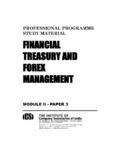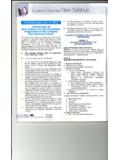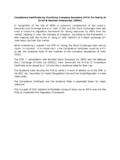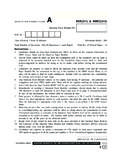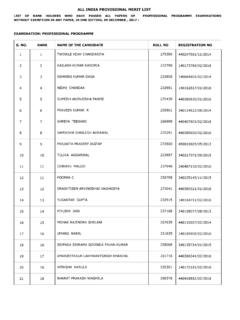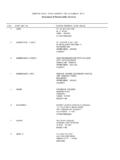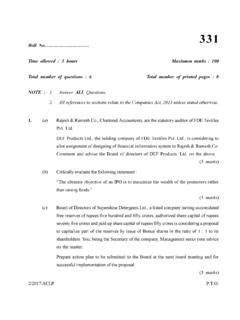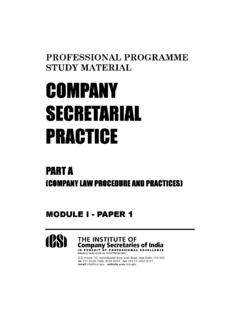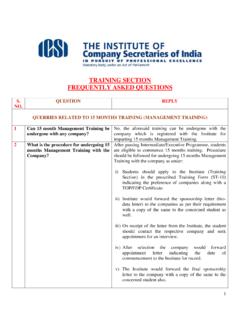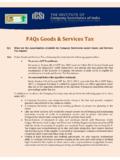Transcription of Syllabus for the Company Secretaries Examination …
1 1 Syllabus for the Company Secretaries Examination The objective of the course is to develop a cadre of Company Secretaries by imparting professional knowledge and training considered pre-requisite for functioning of a Company Secretary whether in employment or in practice. The syllabi for the Examination as set out below give the broad framework within which questions may be asked. The questions may not be necessarily restricted to specific wordings or nomenclature of any terms and legislative enactments contained therein. The field of business being in a constant state of flux, the candidates are expected to be thoroughly conversant with the latest developments in different areas, amendments to the laws or the corresponding provisions of any statutory modification or re-enactment thereof and judicial pronouncements related and relevant to the stated course contents.
2 The candidates are expected to keep track of and have intelligent grasp of the latest developments in the relevant areas that have taken place up to six months preceding the date of Examination . Each paper at the Foundation, Intermediate and Final Examination will be of three hours duration and will carry 100 marks. Medium of writing at the Examination will be English, provided that it shall be competent for the Council to permit, subject to such conditions as it may deem fit and after giving sufficient advance information to the candidates, use of Hindi as a medium of writing for any particular subject(s). 2 PART I Syllabus for Foundation Examination PAPER 1 : ENGLISH AND BUSINESS COMMUNICATION Level of knowledge : Working knowledge.
3 Objective : To develop students ability to communicate correctly and effectively in written English, on matters having relevance to day-to-day business operations with emphasis on quality communication. Detailed contents : PART A : ENGLISH (40 MARKS) 1. Essentials of Good English Grammar and usage; enriching vocabulary, words - multiple meaning, single word for a group of words - choice of words - words frequently misspelt; punctuations, prefix and suffix; parts of speech; articles; synonyms and antonyms; tenses; idioms and phrases; foreign words and phrases commonly used; abbreviations and numerals; pronunciation. 2. Essay Writing Essays on matters of current interest on trade, commerce, industry and profession.
4 3. Precis Writing Preparation of summary of office notes; summary of matters appearing in economic and commercial dailies and journals for use in committee meetings in the office; summary of decisions taken in meetings and conferences. PART B : BUSINESS COMMUNICATION (60 MARKS) 4. Business Communication Meaning and significance of good communication; principles of business communication; means of communication - oral, written, visual, audio-visual; essentials of a good business letter, etc. 5. Business Correspondence Personnel : drafting of interview letters, call letters and offer of appointment; provisional appointment orders; final orders of appointment; employee disciplinary matters show-cause notices, charge sheets, letters of dismissal and other disciplinary actions.
5 Purchase: requests for quotations, tenders, samples and drawings; test order; complaints and follow-up. Sales : drafting of sales letters, circular letters, preparation of sale notes with conditions of sale; status inquiries; preparation of market survey reports; reports to sales manager such as sales promotion matters; drafting of advertisements. Accounts : correspondence with various agencies : customers - regarding dues, follow up letters; banks - regarding over-drafts, cash credits and account current, insurance companies - regarding payment, renewal of insurance premium, claims and their settlement; public authorities like Provident Fund Commissioner, post and telegraph 3authorities, regarding payment of provident fund contributions; installation of new connections and payment of telephone bills; payment of sales tax.
6 Secretarial : correspondence with shareholders and debenture-holders pertaining to dividend and interest, transfer and transmission. Miscellaneous : Resume, letter of application, goodwill messages, condolence letters. 6. Administration and Miscellaneous Drafting of telegraphic and facsimile messages, messages through electronic media; public notices and invitations; representations to Trade Associations, Chambers of Commerce and public authorities. 7. Inter-departmental Communication Internal memos; office circulars; office orders; office notes; representation to chief executive and replies thereto; communication with regional/branch offices. 8. Preparation of Press Releases. PAPER 2 : BASIC ECONOMICS AND BUSINESS ENVIRONMENT Level of knowledge : Basic knowledge.
7 Objective : To provide basic and conceptual understanding of economic concepts, principles of economics and business environment. Detailed contents : PART A : BASIC ECONOMICS (70 MARKS) 1. Nature and Scope of Economics Definition, nature and scope of economics; micro and macro economics; positive and normative economics; working of economic systems with special reference to the capitalistic, socialistic and the mixed economies. 2. Demand Analysis Utility analysis - total utility and marginal utility; law of diminishing marginal utility; law of equi-marginal utility; indifference curves - meaning, properties, marginal rate of substitution; consumers equilibrium; law of demand; elasticity of demand.
8 3. Production, Costs and Revenue Analysis Laws of returns; returns to scale; costs and revenue concepts and their relationship with output; economies and diseconomies of scale. 4. Equilibrium of the Firm and Industry Price and output determination under perfect competition, monopoly and monopolistic competition. 5. National Income Concept, significance and measurement of national income. 6. Money and Credit Concept of money and credit; the Quantity theory of money; the supply of money; credit creation by bank; functions of central banking and its instruments of credit control. 7. Theory of Employment and Income Determination 4 Framework of Keynesian theory of income and employment, consumption function, investment function and their determinants, investment multiplier; determination of level of income and employment; Keynesian theory with reference to developing economies.
9 8. Inflation and Deflation Concept and features of inflation, demand pull and cost push inflation; measures to control inflation; deflation and measures to control it; stagflation. 9. International Trade and Balance of Payments Theory of comparative cost advantage, terms of trade and their determinants, concept of rate of exchange; balance of trade and balance of payments and their relationship, measures against balance of payments disequilibrium. PART B : BUSINESS ENVIRONMENT (30 MARKS) 10. Business Environment An Overview The concept and relevance of business environment; government failure and market failure; market guidance v. State regulation. 11. Indian Economy Salient features of Indian economy a mixture of market forces and government regulation; roles assigned to public and private sectors.
10 Role of government in the areas of (i) infrastructure; (ii) industrial policy; (iii) labour and industrial relations; (iv) foreign trade, balance of payments and foreign investment and (v) taxation and subsidies. 12. Indian Financial System and Recent Developments. PAPER 3 : FINANCIAL ACCOUNTING Level of knowledge : Basic knowledge. Objective : To provide an understanding of the basic principles of accounting and their application in business. Detailed contents : 1. Accounting - meaning, nature, functions and usefulness; types of accounting; accounting equation; generally accepted accounting concepts, principles and conventions; double entry system. 2. Recording of transactions - preparation of ledger accounts, subsidiary books, recording of cash and bank transactions, preparation of trial balance; voucher system.
